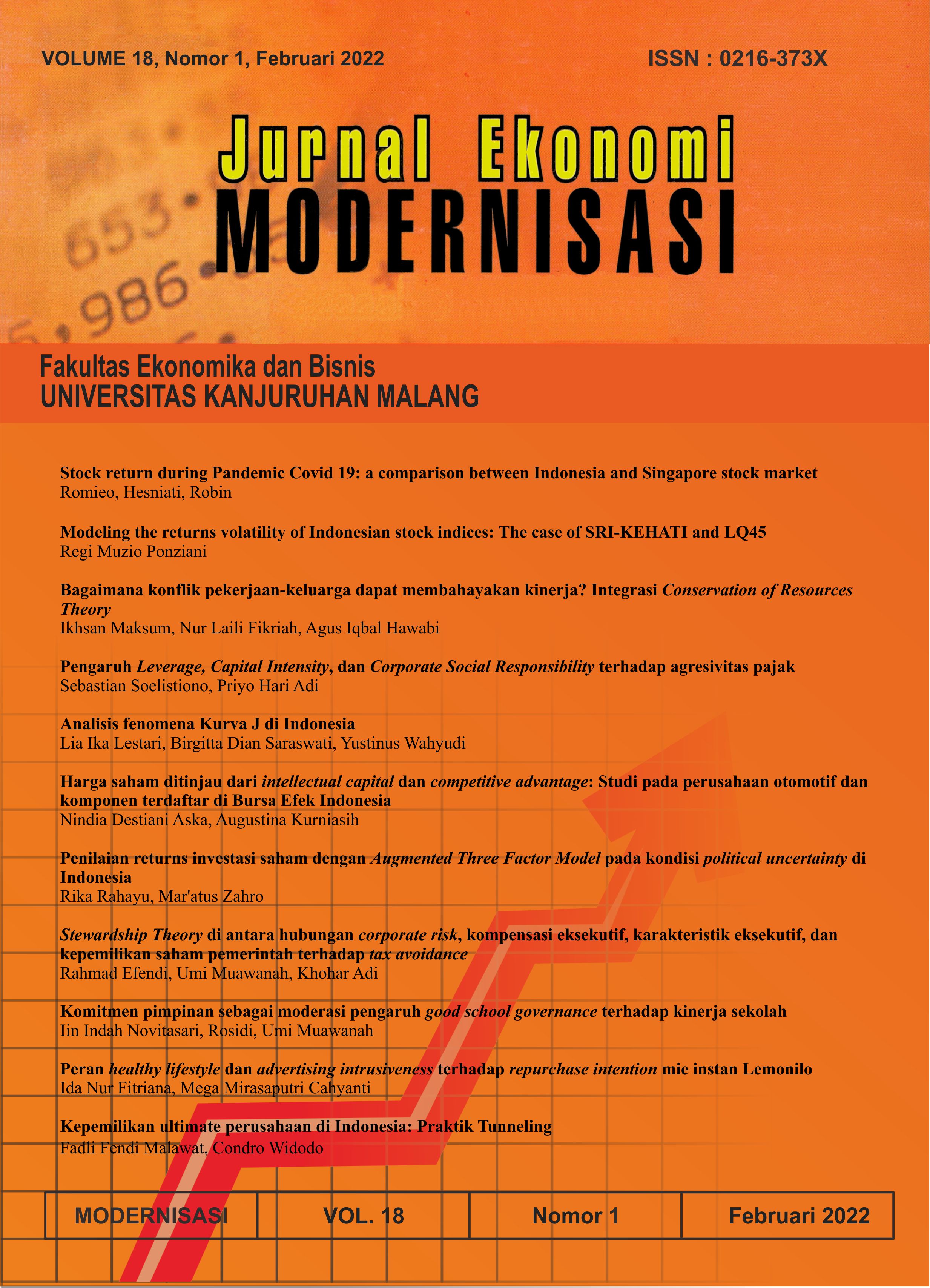Stock return during Pandemic Covid 19: a comparison between Indonesia and Singapore stock market
Main Article Content
Abstract
The purpose of this study is to provide an overview of the stock market conditions of IDX and SGX due to the influence of COVID 19. Through a regression analysis study method to see the condition of stock returns on companies in IDX and SGX. These two countries were taken as the focus of the study considering the closeness of business relationships and the highest number of COVID 19 cases in the Southeast Asia Region. The researcher concludes that the IDX is more sensitive to the increase confirmed case of COVID 19 and the SGX is more sensitive to the increase deaths cases of COVID 19. The conclusion of this study is that the threat of COVID 19 will have a different effect on investor behavior in each country, this could be due to the influence of differences between cultural values and characteristics. Like other studies, this study also has limitations that have not carried out a fixed effect on the two countries and recommendations to increase the number of samples from other ASEAN countries to make results that can be generalized in ASEAN.
Downloads
Article Details
Authors who submit a manuscript understand that if the manuscript is accepted for publication, the copyright of the article shall be assigned to Jurnal Ekonomi Modernisasi (JEM).
References
Al-Awadhi, A. M., Alsaifi, K., Al-Awadhi, A., & Alhammadi, S. (2020). Death and contagious infectious diseases: Impact of the COVID-19 virus on stock market returns. Journal of Behavioral and Experimental Finance, 27, 100326. https://doi.org/10.1016/j.jbef.2020.100326
Atkenson, A. (2020). What Will Be The Economic Impact of Covid-19 in the US? NBER Working Paper Series, 53(9), 1689–1699.
Barua, S. (2020). Munich Personal RePEc Archive COVID-19 pandemic and world trade: Some analytical notes COVID-19 pandemic and world trade: Some analytical notes. Munich Personal RePEc Archive, 99761, 1–36.
Bourdeau, M., & Kryzanowski, B. L. (2016). The Impact Of Natural Disasters On The Stock Returns and Volatilities Of Local Firms. Quarterly Review of Economics and Finance, 1–42. https://doi.org/10.1016/j.qref.2016.05.003
Casandra, W. (2018). Top values of Singapore society include “kiasuâ€Â, “complainingâ€Â, “self-centredâ€Â: survey. Yahoo News Singapore, 1–6.
Das, D., & Zhang, J. J. (2021). Pandemic in a smart city: Singapore’s COVID-19 management through technology & society. Urban Geography, 42(3), 408–416. https://doi.org/10.1080/02723638.2020.1807168
Fernandes, N. (2020). Economic effects of coronavirus outbreak ( COVID-19 ) on the world economy Nuno Fernandes Full Professor of Finance IESE Business School Spain. SSRN Electronic Journal, ISSN 1556-5068, Elsevier BV, 0–29.
Gruszczynski, L. (2020). The CoviD-19 pandemic and international trade: Temporary turbulence or paradigm shift? European Journal of Risk Regulation, 11(2), 337–342. https://doi.org/10.1017/err.2020.29
Hadya, R., Begawati, N., & Yusra, I. (2017). Analisis Efektivitas Pengendalian Biaya, Perputaran Modal Kerja, dan rentabilitas Ekonomi Menggunakan Regresi Data Panel. Jurnal Pundi, 37(12), 1648–1653.
Hanum, Z., & Humaniora. (2021). Satu Tahun Perjalanan Covid-19, Maret yang Mencekam. Media Indonesia.
Hastuti, P. (2020). Fenomena Kurs Rupiah Sebelum Dan Selama Covid-19. Niagawan, 9(3), 197. https://doi.org/10.24114/niaga.v9i3.18936
Heston, S. L., & Sinha, N. R. (2017). News vs. sentiment: Predicting stock returns from news stories. Financial Analysts Journal, 73(3), 67–83. https://doi.org/10.2469/faj.v73.n3.3
Ichev, R., & MarinÄÂ, M. (2018). Stock prices and geographic proximity of information: Evidence from the Ebola outbreak. International Review of Financial Analysis, 56, 153–166. https://doi.org/10.1016/j.irfa.2017.12.004
Idris, M. (2021). Daftar 10 Saham Paling Mahal di Bursa Efek Indonesia 2021. Www.Kompas.Com.
Jackson, J. K., Weiss, M. A., Schwarzenberg, A. B., Nelson, R. M., Sutter, K. M., & Sutherland, M. D. (2020). Global Economic Effects of COVID-19. Congressional Research Service, 20, 78.
Kaplanski, G., & Levy, H. (2010). Sentiment and stock prices: The case of aviation disasters. Journal of Financial Economics, 95(2), 174–201. https://doi.org/10.1016/j.jfineco.2009.10.002
Lee. (2020). Wuhan Novel coronavirus (COVID-19): why global is challenging? Public Health, 02(January), 19–21.
Li, K. (2018). Reaction to news in the Chinese stock market: A study on Xiong’an New Area Strategy. Journal of Behavioral and Experimental Finance, 19, 36–38. https://doi.org/10.1016/j.jbef.2018.03.004
Luo, S., & Tsang, K. P. (2020). China and World Output Impact of the Hubei Lockdown During the Coronavirus Outbreak. Contemporary Economic Policy, 38(4), 583–592. https://doi.org/10.1111/coep.12482
Luthfia, A. (2014). Dalam Dunia Kerja Global. Humaniora, 1(5), 9–22.
Lyke, B. N. (2019). A Test Of The Efficiency Of The Foreign Exchange Market in Indonesia. Bulletin of Monetary Economics and Banking, 21(12), 439–464.
Ming, W., Zhou, Z., Ai, H., Bi, H., & Zhong, Y. (2020). COVID-19 and Air Quality: Evidence from China. Emerging Markets Finance and Trade, 56(10), 2422–2442. https://doi.org/10.1080/1540496X.2020.1790353
Mnif, E., Jarboui, A., & Mouakhar, K. (2020). How the cryptocurrency market has performed during COVID 19? A multifractal analysis. Finance Research Letters, 36(June), 101647. https://doi.org/10.1016/j.frl.2020.101647
Nippani, S., & Washer, K. M. (2004). SARS: A non-event for affected countries’ stock markets? Applied Financial Economics, 14(15), 1105–1110. https://doi.org/10.1080/0960310042000310579
Rizqi, R. M., & Ak, M. (2021). Analysis of Monday Effect and Friday Effect Towards the Return of 27 Business Index Shares in Indonesia Stock Exchange 2015-2020. 6(5), 797–801.
Salisu, A. A., & Akanni, L. O. (2020). Constructing a Global Fear Index for the COVID-19 Pandemic. Emerging Markets Finance and Trade, 56(10), 2310–2331. https://doi.org/10.1080/1540496X.2020.1785424
Saraswati, N. M. A. W., & Mustanda, I. K. (2018). Reaksi Pasar Modal Indonesia Terhadap Peristiwa Pengumuman Hasil Penghitungan Suara Pemilihan Umum Dan Pelantikan Presiden Amerika Serikat. E-Jurnal Manajemen Universitas Udayana, 7(6), 2971. https://doi.org/10.24843/ejmunud.2018.v07.i06.p05
Shu, H. C. (2010). Investor mood and financial markets. Journal of Economic Behavior and Organization, 76(2), 267–282. https://doi.org/10.1016/j.jebo.2010.06.004
Susilawati, S., Falefi, R., & Purwoko, A. (2020). Impact of COVID-19’s Pandemic on the Economy of Indonesia. Budapest International Research and Critics Institute (BIRCI-Journal): Humanities and Social Sciences, 3(2), 1147–1156. https://doi.org/10.33258/birci.v3i2.954
Widayanti, R., & Colline, F. (2017). Pengaruh Rasio Keuangan Terhadap Harga Saham. Jurnal Riset Bisnis Dan Investasi, 4(3), 47. https://doi.org/10.35697/jrbi.v4i3.1256
World Bank. (2020). Historic contraction of per capita income. Global Economic Prospects.
World Health Organization. (2020). Pertanyaan dan jawaban terkait Coronavirus. Pertanyaan Dan Jawaban Terkait Coronavirus, 1–13.
Xu, L. (2021). Stock Return and the COVID-19 pandemic: Evidence from Canada and the US. Finance Research Letters, 38(July 2020), 101872. https://doi.org/10.1016/j.frl.2020.101872
